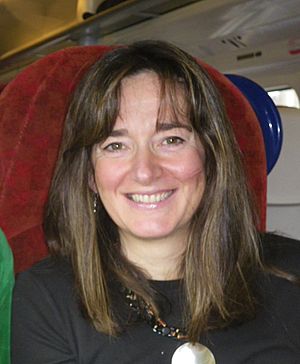Nancy Papalopulu facts for kids
Quick facts for kids
Nancy Papalopulu
FMedSci FRSB
|
|
|---|---|

Papalopulu in 2014
|
|
| Born |
Athanasia Papalopulu
26 March 1962 |
| Nationality | Greek |
| Alma mater | Aristotle University of Thessaloniki (BSc) University of London (PhD) |
| Awards | EMBO Member (2012) |
| Scientific career | |
| Fields | Developmental neurobiology |
| Institutions | University of Manchester University of Cambridge |
| Thesis | Analysis of vertebrate homeobox containing genes (1991) |
| Doctoral advisor | Robb Krumlauf |
Nancy Papalopulu, born in 1962, is a well-known scientist from Greece. She is a Professor of Developmental Neuroscience at the University of Manchester in the UK. This means she studies how brains and nervous systems grow and develop. She is also a senior research fellow for the Wellcome Trust, which supports important scientific research.
Contents
Her Early Studies
Nancy Papalopulu first studied Pharmacy at the Aristotle University of Thessaloniki in Greece. After finishing her degree, she moved to London in 1986. There, she started her PhD at the National Institute for Medical Research.
She worked with a scientist named Robb Krumlauf. Her research focused on how special genes, called Hox genes, help shape the nervous system. She finished her PhD in 1991.
Career and Research
In 1991, Nancy moved to California, USA, to continue her research. She worked at the Salk Institute with Chris Kintner. She kept studying how nerve cells develop in animal embryos, especially using Xenopus (a type of frog) as a model.
During this time, she became very interested in how the timing of nerve cell development is controlled. This is a big question in science.
Setting Up Her Own Lab
In 1997, Nancy received an important award from the Wellcome Trust. This allowed her to move back to the UK and start her own research lab. Her lab was at the Gurdon Institute at the University of Cambridge.
At Cambridge, she even shared lab space with Sir John Gurdon. He won the Nobel Prize in Physiology or Medicine in 2012 for his amazing work with Xenopus embryos. His discoveries helped us understand how cells can be reprogrammed.
Nancy's own research focused on how cells decide to become nerve cells. She studied how the cell cycle (how cells divide), cell polarity (how cells are organized), and their location affect this process. She wanted to know how these factors control the balance between keeping cells as basic building blocks or letting them become specialized nerve cells.
Moving to Manchester
In 2006, Nancy moved her lab to the University of Manchester. There, she became a leader for the developmental biology research group. She continued to investigate how the timing of nerve cell creation, called neurogenesis, is managed as animals develop.
Her team uses both computational modeling (using computers to understand complex systems) and experiments. They found that a tiny molecule called microRNA miR-9 plays a key role. It targets another important molecule, HES1, which helps control nerve cell development. This discovery helps explain how nerve cells are made at just the right time.
Awards and Honours
Nancy Papalopulu has received many awards for her important scientific work:
- She was named Researcher of the Year by the Faculty of Life Sciences at the University of Manchester in 2013.
- In May 2013, she became a Fellow of the Academy of Medical Sciences (FMedSci).
- She was elected a member of the European Molecular Biology Organisation (EMBO) in May 2012.
- She became a Fellow of the Royal Society of Biology (FRSB) in June 2011.
- She was a Wellcome Trust senior research fellow from 2000 to 2015, which is a very prestigious position.

